New Synology FS3410 Flashstation NAS Revealed
Synology has really been on a roll recently with revealing their 2022/2023 solutions, with 7-8 different solutions being unveiled and (for the most part) released in the last 3 months or so. The Synology RS3410 NAS that today’s article covers is the latest addition to the brand’s quiet but steadily growing Flashstation server series. Started more than four years ago, Synology has gradually added several desktop and rackmount solutions to this area of their portfolio and the FS3410 is the SECOND entry into this product family this year (the other being the FS2500 affordable 1U rackmount released much earlier in 2022). Although very similar to the rest of the enterprise solutions from Synology in terms of software (all arriving with DSM 7.1 and supporting the full range of features and services), the flashstation series is specifically aimed at SSD populate, flash storage practical applications and has a few NAND durability considerations thrown in for this more high performing but endurance aware media. This new flashstation server is designed to sit in the middle of the existing pack of FS systems (so, FS2500 > FS3410 > FS3600 > FS6400 Flashstation, scaling upwards) and arrives with support of SATA SSD media in the Synology SAT5200 and SAT5210 media range. Let’s discuss the hardware, compatibility, availability and pricing we will expect from the new Synology FS3410 Flash Rackmount server.
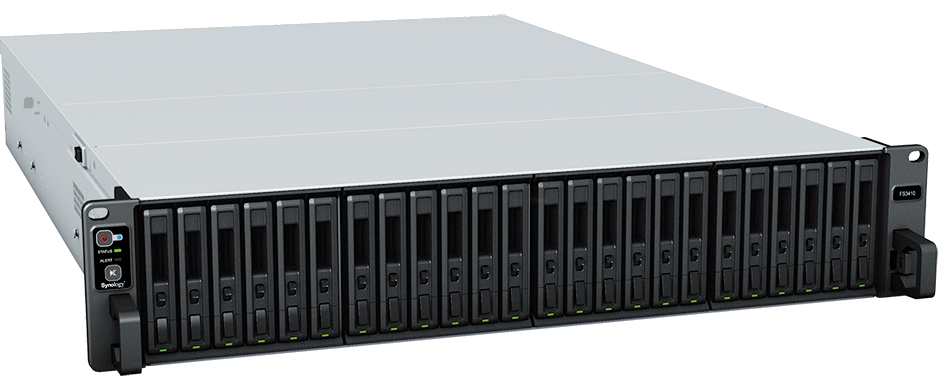
What are the Hardware Specifications of the Synology FS3410 Rackmount NAS
The specifications of the Synology FS3410 Flashstation NAS are (somewhat unsurprisingly) quite beefy, arriving with an EIGHT CORE Xeon processor, 16-128GB of DDR4 ECC RDIMM memory, dual 10GbE onboard and the option to add two high-performance PCIe cards (that can be scaled up to dual-port 25GbE fiber cards). Flash media servers NEED to have high-end surrounding components as the media inside (particularly when you factor RAID) can reach some truly astonishing performance levels – so it is imperative that you remove any potential bottlenecks that may impede that tremendous throughout. The CPU inside IS rated at over 10K on CPUBenchmark, can hit 2.7Ghz per core when needed in burst and is a 16-thread processor – meaning plenty of vCPUs in virtualization when needed. It is highlighting however that this processor isn’t the newest and was first launched back in 2016. This is not too unusual, as server processors do tend to be revealed and released to distribution a long time before they are fully utilized in mainstream server systems. Still, that is still quite an older CPU than some of the embedded Ryzen or Intel Xeon Silvers that Synology has been using lately. Nevertheless, this CPU will be highly proficient at pushing those 24 bays of SATA SSD storage to their high-performance potential.
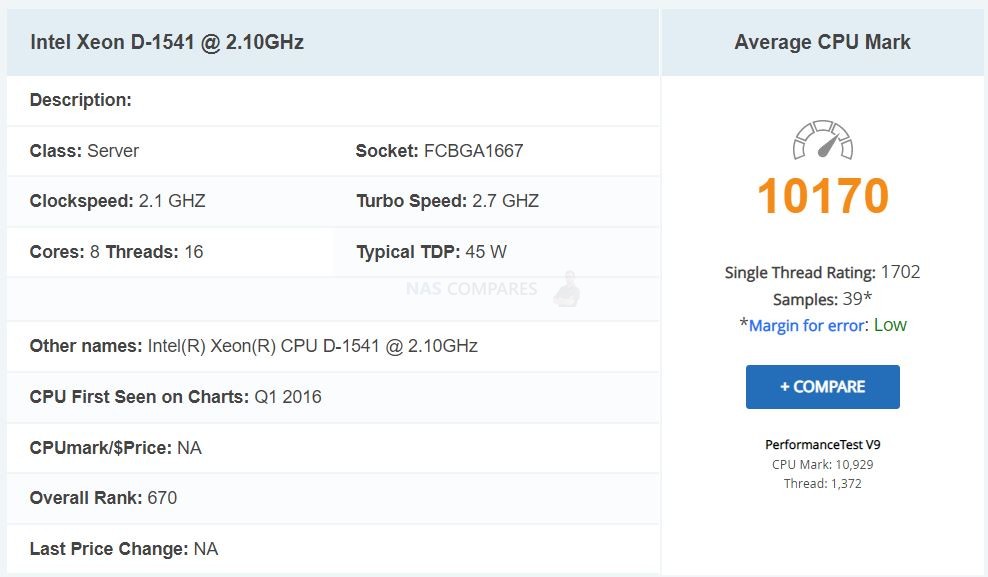
In terms of the connectivity and scalability of the Synology FS3410 NAS, the rest of the specifications are quite solid. Those PCIe upgrade options (both PCIe Gen 3 x8), the two copper 10GbE ports (10GBASE-T) and four ethernet ports provide a great range of connectivity available on this device and mean that, when fully populated, it allows you to hit a reported 356,500/129,400 iSCSI 4K random read/write IOPS and 6,970/3,536 Sequential Read/Write (RAID F1, Synology SAT5200-960G SATA SSD installed in all bays).
Here is how the rest of the specifications of the Synology FS3410 pan out. It’s quite a solid build, 2U in height, Redundant PSU equipped and full depth.
|
processor
|
Processor model | Intel Xeon D-1541 |
|---|---|---|
| Number of CPUs | 1 | |
| processor architecture | 64-bit | |
| processor clock | 8-core 2.1 (base frequency) / 2.7 (max overclock) GHz | |
| Hardware Encryption Engine (AES-NI) | YES | |
|
Memory
|
system memory | 16 GB DDR4 ECC RDIMMs |
| Pre-installed memory modules | 16 GB (16 GB x 1) | |
| Total number of memory slots | 4 | |
| Maximum memory capacity | 128GB (32GB x 4) | |
 |
||
|
storage device
|
number of disk slots | twenty four |
| Compatible Disk Types* (See All Supported Disks) | 2.5″ SATA SSD | |
| Disk hot-plug support | YES | |
| Remark |
|
|
|
External port
|
RJ-45 1GbE port* | 4 (Support Link Aggregation / Failover) |
| RJ-45 10GbE port | 2 (Support Link Aggregation / Failover) | |
| management port | 1 | |
| Maximum number of LAN ports | 15 | |
| USB 3.2 Gen 1 port* | 2 | |
 |
||
|
PCIe
|
PCIe expansion | 2 x Gen3 x8 slots (x8 link) |
|
file system
|
internal disk |
|
| external disk |
|
|
| Remark | You can install the exFAT Access package for free from DSM 7.0’s Package Center. If you use DSM 6.2 or earlier, you need to purchase exFAT Access in Package Center. | |
|
Exterior
|
Dimensions (rack unit) | 2U |
| Size (HXWXD) | 88mm x 482mm x 724mm | |
| weight | 15.0 kg | |
| Rack Mount Support* | Four Post 19″ (Synology Rack Kit – RKS-02 ) | |
| Remark | Rack kit sold separately | |
|
other projects
|
system fan | 80mm x 80mm x 4pcs |
| fan mode |
|
|
| Replaceable system fan | YES | |
| Power auto-recovery | YES | |
| Noise value* | 46.1 dB(A) | |
| Timer switch | YES | |
| wake on lan | YES | |
| Power Supply / Transformer | 550W | |
| Dual power supply | YES | |
One last thing to note about the FS3410 Flashstation is that, much like many of the recent Synology enterprise and hyper-scale solutions released/planned by the brand in 2022/2023, the compatibility of drive SSD media is listed on the official pages as Synology SAT5200/SAT5210 SSDs only. That means that using non-Synology branded media in this system will place you in a position where the brand might not be able/willing to assist you with support. The Synology SAT5200/5210 series of SSDs ARE high in durability, though their performance is a little under alternatives from WD, Western Digital Ultrastar and Seagate – so some users might be less keen on this.
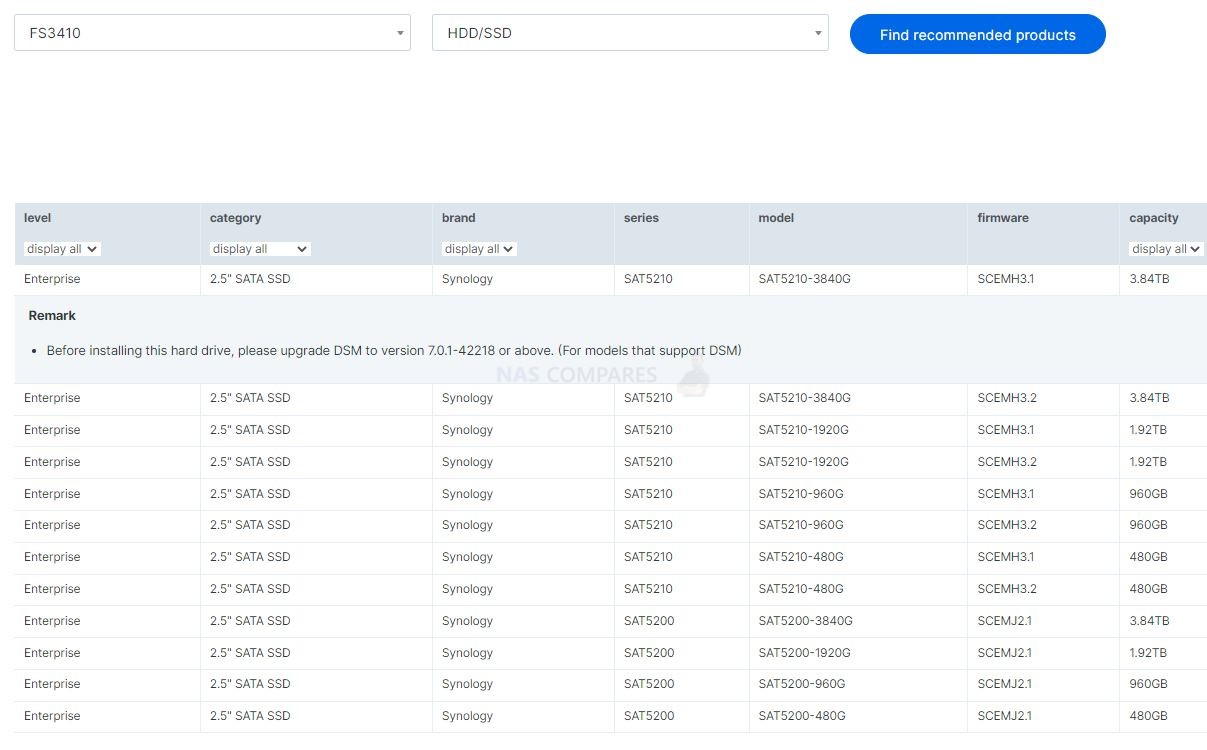
HOWEVER! It is also worth noting that solutions like the Synology FS3410 are intended for a very high-end class of business user and typically those users prefer a single provider/all-in-one solution and THOSE users are going to be more than happy with Synology providing a range of their own storage media in conjunction with this device, as well as prefer it all to be an in-house solution (warranty, support, replacement, on-site tech help, etc). Therefore the stricter compatibility on this server is less of a barrier than normal. Let’s discuss where this system sits in the Synology Flashstation portfolio.
How Does the Synology FS3410 NAS Compare with the FS2500, FS3600 and FS6400 Flashstation?
As mentioned, the Synology FS3410 Rackmount is the latest addition to the Flashstation portfolio. Over the years, we have seen some hugely impressive servers join this product family and having a much more fleshed-out range of solutions so that businesses can cater their budgets towards the area that they need it most, is always going to be appreciated. The FS3410 sits between the FS2500 and FS3600 solution in terms of power, features, hardware and pricing (and quite far behind the FS6400 MONSTER Flashstation server).

Here is how the four Flashstation servers compare in terms of their hardware. The hardware scales i na numebr of different directions (capacity, CPU power, eternal connecctivity, scalabilty and more) and therefore allows the end user to pour their budget towards the areas of flash storage that their business solution is needed for.
|
FS2500
|
FS3410
|
FS3600
|
FS6400
|
|||||
| Hardware | ||||||||
| processor | ||||||||
| Processor model | AMD Ryzen V1780B | Intel Xeon D-1541 | Intel Xeon D-1567 | Intel Xeon Silver 4110 | ||||
| Number of CPUs | 1 | 1 | 1 | 2 | ||||
| processor architecture | 64-bit | 64-bit | 64-bit | 64-bit | ||||
| processor clock | 4-core 3.35 (base frequency) / 3.6 (max overclock) GHz | 8-core 2.1 (base frequency) / 2.7 (max overclock) GHz | 12-core 2.1 (base frequency) / 2.7 (max overclock) GHz | 8-core 2.1 (base frequency) / 3.0 (max overclock) GHz | ||||
| Hardware Encryption Engine (AES-NI) | ||||||||
| Memory | ||||||||
| system memory | 8 GB DDR4 ECC UDIMMs | 16 GB DDR4 ECC RDIMMs | 16 GB DDR4 ECC RDIMMs | 32GB DDR4 ECC RDIMMs | ||||
| Pre-installed memory modules | 8 GB (8 GB x 1) | 16 GB (16 GB x 1) | 16 GB (16 GB x 1) | 32GB (16GB x 2) | ||||
| Total number of memory slots | 2 | 4 | 4 | 16 | ||||
| Maximum memory capacity | 32GB (16GB x 2) | 128GB (32GB x 4) | 128GB (32GB x 4) | 512GB (32GB x 16) | ||||
| number of disk slots | 12 | twenty four | twenty four | twenty four | ||||
| Maximum number of disk slots to install expansion units | 48 (RX1217sas x 2) / 72 (FX2421* x 2) | 48 (RX1217sas x 2) / 72 (FX2421* x 2) | ||||||
| Compatible Disk Types* (See All Supported Disks) | 2.5″ SATA SSD | 2.5″ SATA SSD |
|
|
||||
| RJ-45 1GbE port | 4 (Support Link Aggregation / Failover) | 2 (Support Link Aggregation / Failover) | ||||||
| RJ-45 1GbE port* | 2 (Support Link Aggregation / Failover) | 4 (Support Link Aggregation / Failover) | ||||||
| RJ-45 10GbE port | 2 (Support Link Aggregation / Failover) | 2 (Support Link Aggregation / Failover) | 2 (Support Link Aggregation / Failover) | 2 (Support Link Aggregation / Failover) | ||||
| management port | 1 | |||||||
| Maximum number of LAN ports | 15 | |||||||
| USB 3.2 Gen 1 port* | 2 | 2 | 2 | 2 | ||||
| expansion port | 1 | 1 | ||||||
| Remark |
|
|
In 2019, USB-IF rebranded the standard formerly known as USB 3.0 to USB 3.2 Gen 1. | In 2019, USB-IF rebranded the standard formerly known as USB 3.0 to USB 3.2 Gen 1. | ||||
| PCIe | ||||||||
| PCIe expansion | 1 x Gen3 x8 slot (x4 link) | 2 x Gen3 x8 slots (x8 link) | 1 x Gen3 x8 slot (x8 link) | 2 x Gen3 x8 slots (x8 link) | ||||
| Dimensions (rack unit) | 1U | 2U | 2U | 2U | ||||
| Size (HXWXD) | 44mm x 481.9mm x 555.9mm | 88mm x 482mm x 724mm | 88mm x 482mm x 724mm | 88mm x 482mm x 724mm | ||||
| weight | 8.3 kg | 15.0 kg | 14.9 kg | 17.26 kg | ||||
| Rack Mount Support* | Four Post 19″ (Synology Rack Kit – RKS-01 ) | Four Post 19″ (Synology Rack Kit – RKS-02 ) | Four Post 19″ (Synology Rack Kit – RKS-02 ) | Four Post 19″ (Synology Rack Kit – RKS-02 ) | ||||
| Remark | Rack kit sold separately | Rack kit sold separately | Rack kit sold separately | Rack kit sold separately | ||||
| Power Supply / Transformer | 350W | 550W | 500W | 800W | ||||
| Recommended number of virtual machines | 8 (see more) | 16 (see more) | 24 (see more) | 32 (see more) | ||||
| Recommended number of Virtual DSMs (license required) | 8 (including 1 set of free licenses) | 16 (including 1 free license) | 24 (including 1 free license) | 32 (with 1 set of free licenses) | ||||
When will the Synology FS3410 Flashstation NAS Be Released and How much will it cost?
The Synology FS3410 Flashstation NAS is already appearing on the official Synology Taiwan pages and will likely appear on the global (i.e U.S, Europe, etc) within the next few weeks. Regarding pricing, this IS an enterprise product and will be priced as such. The flashstation series has always had a price tag that is considerably HIGHER than the rest of the Synology portfolio, but considerably LOWER than most other flash server solutions in the enterprise sector (HP, EMC, Netapp, blah, blah). Given the Synology FS2500 has a $3500 price tag, the FS3600 has a $6500 price tag and the top dog FS6400 has a $12000 price tag, I think we can see the Synology FS3410 Flashstation arriving around the $4500-5000 mark (tax and your local region making all the difference). I look forward to sharing more on the FS3410 Flashstation and other units in this product series later in 2022/2023.
📧 SUBSCRIBE TO OUR NEWSLETTER 🔔🔒 Join Inner Circle
Get an alert every time something gets added to this specific article!
This description contains links to Amazon. These links will take you to some of the products mentioned in today's content. As an Amazon Associate, I earn from qualifying purchases. Visit the NASCompares Deal Finder to find the best place to buy this device in your region, based on Service, Support and Reputation - Just Search for your NAS Drive in the Box Below
Need Advice on Data Storage from an Expert?
Finally, for free advice about your setup, just leave a message in the comments below here at NASCompares.com and we will get back to you. Need Help?
Where possible (and where appropriate) please provide as much information about your requirements, as then I can arrange the best answer and solution to your needs. Do not worry about your e-mail address being required, it will NOT be used in a mailing list and will NOT be used in any way other than to respond to your enquiry.
Need Help?
Where possible (and where appropriate) please provide as much information about your requirements, as then I can arrange the best answer and solution to your needs. Do not worry about your e-mail address being required, it will NOT be used in a mailing list and will NOT be used in any way other than to respond to your enquiry.

|
 |
UniFi Routers vs OpenWRT DIY Routers - Which Should You Choose?
WHY IS PLEX A BIT S#!t NOW? IS 2026 JELLYFIN TIME? (RAID Room)
Synology FS200T NAS is STILL COMING... But... WHY?
Gl.iNet vs UniFi Travel Routers - Which Should You Buy?
UnifyDrive UP6 Mobile NAS Review
UniFi Travel Router Tests - Aeroplane Sharing, WiFi Portals, Power Draw, Heat and More
Access content via Patreon or KO-FI
Discover more from NAS Compares
Subscribe to get the latest posts sent to your email.


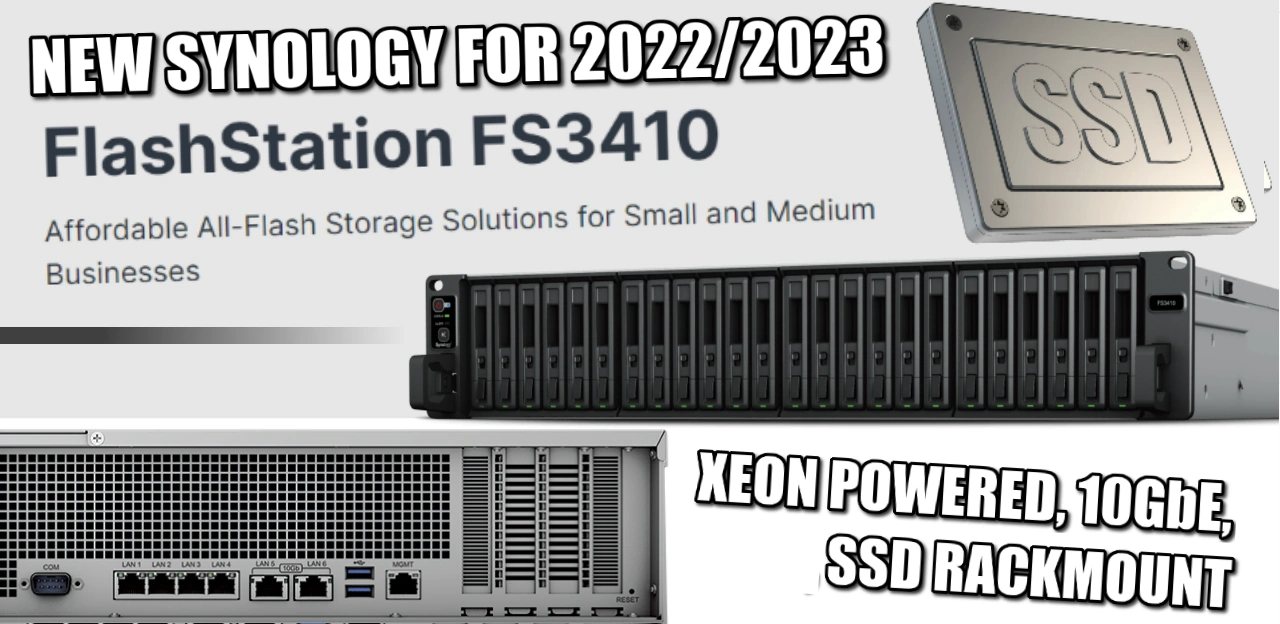
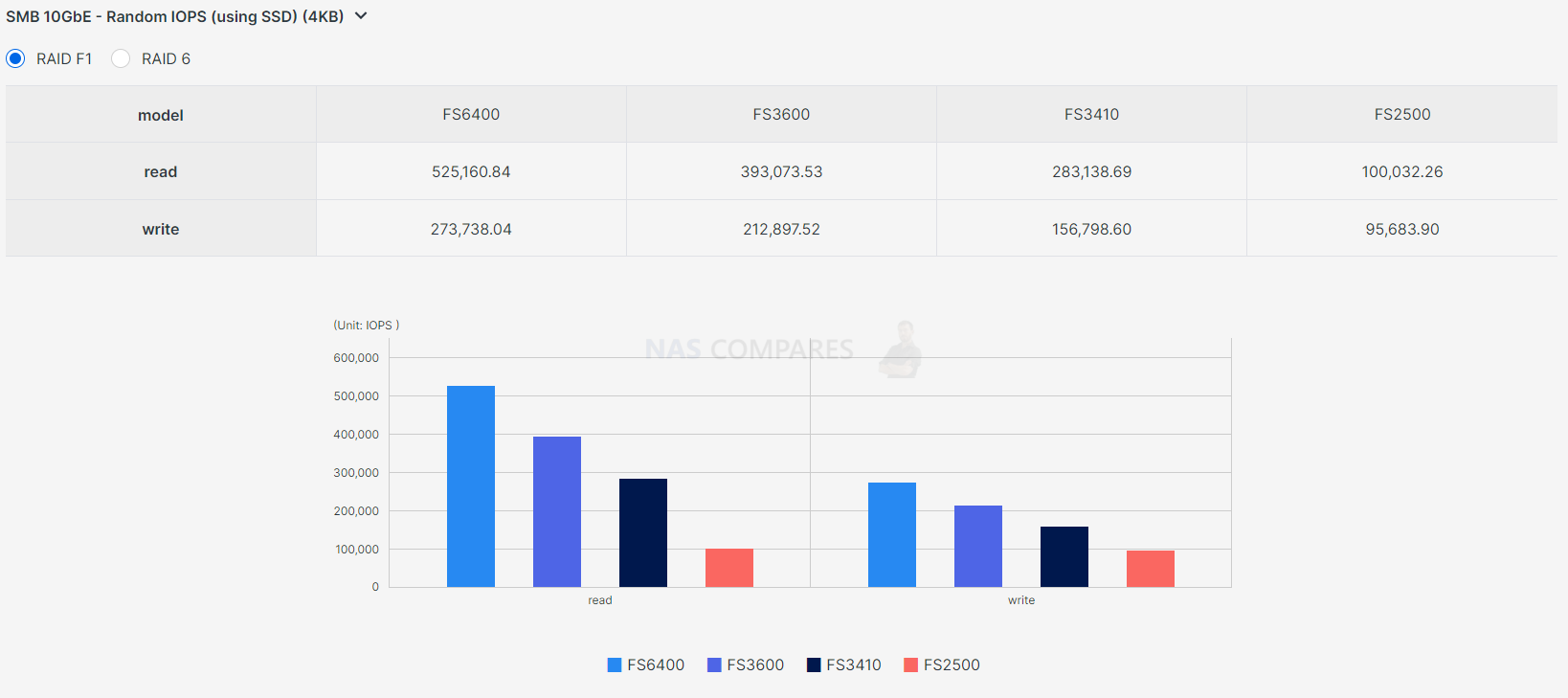
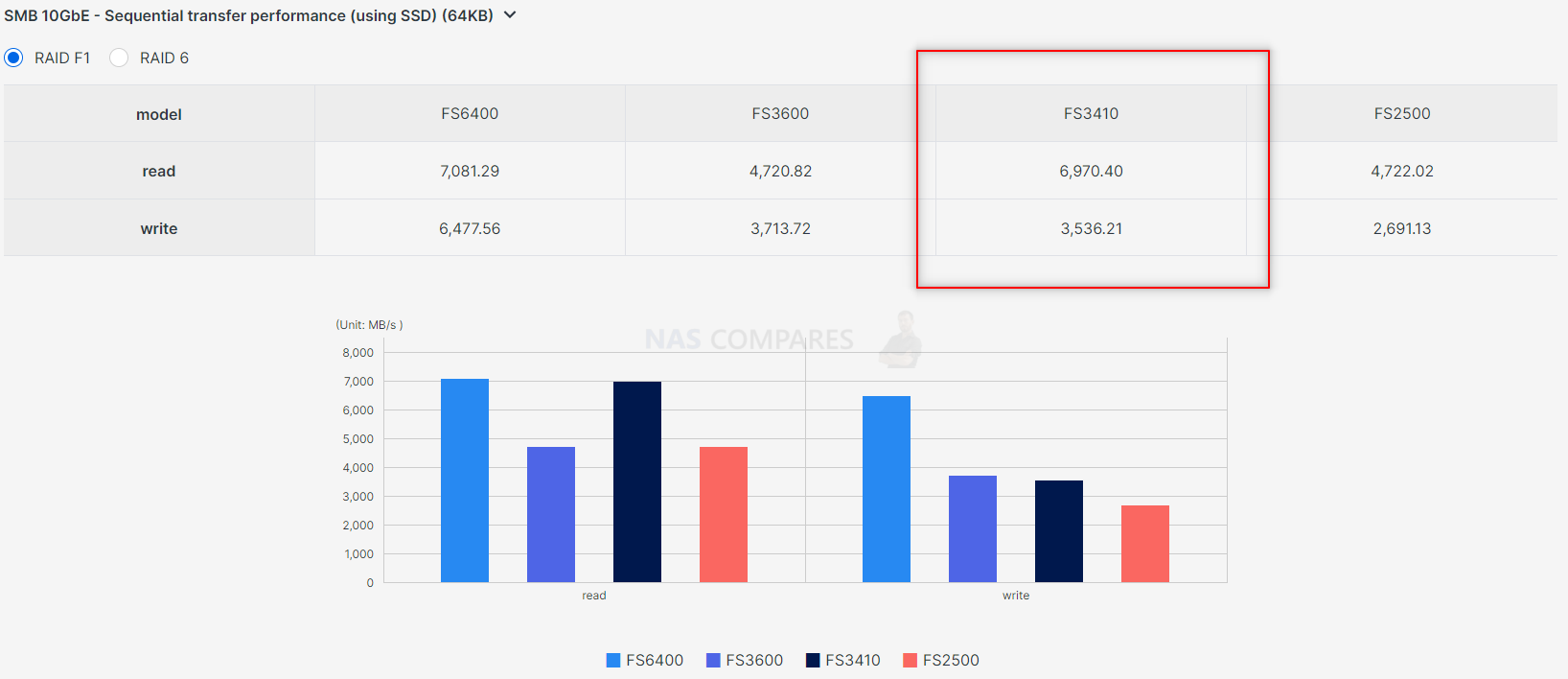



Can you do a comparison on synology 2422 and 3622 and which one would be a more preferred for individuals. I cand find a comparison video anywhere
REPLY ON YOUTUBE
Will ssd improve the smoothness of gameplay graphics?
REPLY ON YOUTUBE
I have 4 of the previous 3400 models filled with 2TB drives and expanded with 40gbit networking as iscsi storage for VMware servers. Has been incredibly reliable and stable. When buying that many drives, the extra premium synology want for their own branded drives was thousands more than buying micron/Samsung/intel enterprise drives while offering no practical benefit in endurance or performance.
REPLY ON YOUTUBE
That is asking a lot of that hardware, and not in a good way. B&H is listing it for $6,299.99, that’s Apple levels of overcharging to hamstring SSD’s like that. Then you have to add in $350 per ssd and $100 for rails. I’m not even going to bother mentioning how much they want per 16gb rdimm. The professional in me knows this isn’t truly that expensive for what it is but the DIY on a budget home lab guy in me also knows if you know what you are doing you can spend a heck of a lot less than this and get similar/better performance.
REPLY ON YOUTUBE
Still no u.2 nvme arrary model, bad
REPLY ON YOUTUBE
Terrible, especially for those moving from the ’18 model (when no vendor locking was a marketed feature!).
This looks to be utterly crippled by the 6 year-old CPU with a max sequential throughput of just 6,970 / 3,536 MB/s – in 2022 (!) – even with no encryption or additional overheads! Even though it is hamstrung by its SATA-only backplane it should be performing well above 12,000 MB/s with x24 SATA SSDs. There is simply no excuse having a CPU that cannot keep-up with the storage alone, let alone any addition packages, services or VMs.
Wise of Synology to sneak this out with no fanfare; probably best smuggled back in under a black bin-bag.
REPLY ON YOUTUBE